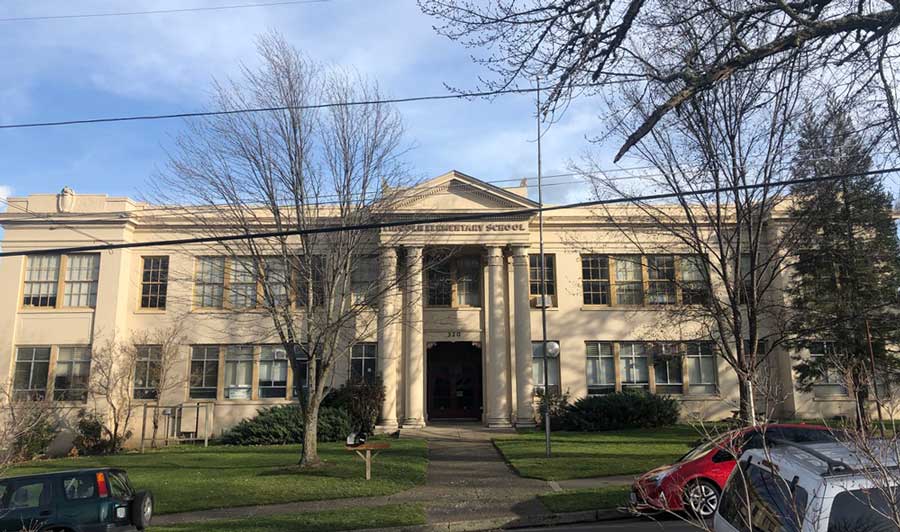About 1,800 newspapers in the country have folded since 2004
By Damian Mann for Ashland.news
Local residents discussed a new paradigm for local news at the Ashland Public Library Tuesday in an age when journalism has withered in the face of social media and the rise of the internet.
A full room of about 90 people showed up for “The Current State of Local/Regional Journalism,” part of the “Big Ideas” series presented by the Association of University Women and Jackson County Library Services.

The three featured speakers were Bert Etling, Ashland.news executive editor; Bob Wise, KOBI-TV NBC5 vice president and general manager; and Heidi Wright, president of FORJournalism, a nonprofit.
Etling said that about 1,800 newspapers in the country have folded since 2004, creating news deserts. The Medford Mail Tribune and the Ashland Daily Tidings, of which Etling was editor from 2014 to 2019, have both been shuttered.

The effect of the closures nationwide has been to gravitate people more toward national news, leading to increased polarization and partisanship, Etling said. Google, Facebook and other internet companies have sucked up articles written by newspapers while also failing to verify the validity of many information sources, helping to fuel misinformation.
“Facebook has stopped fact-checking,” said Etling, citing a recent news report. “Who knew they were fact-checking?”
For years, newspapers relied on advertising revenues for profits, but now those advertising dollars are going to internet-based companies.

“The economic model is broken,” Etling said. Ashland.news is a nonprofit, sustained by fund-raising and donations, similar to Jefferson Public Radio.
“The nonprofit model is rapidly growing around the country,” said Etling. “This is a booming model.”
Instead of a for-profit model, a nonprofit puts the readers and community first, he said.
“Information needs to be free and accessible to everybody,” Etling said. “People need to know what’s going on in their community.”
Etling said the Ashland Tidings may have closed, but in its place the “fake Tidings” website is available on the internet.
The fake Ashland Tidings website, as reported by Oregon Public Broadcasting, was put together by scammers using artificial intelligence. The website appears to scrape up local news stories to provide content.

While newspapers have gone through a lot of upheaval in the Rogue Valley, TV news station have not been immune, though one local station has bucked this trend.
Wise, who works for locally owned KOBI, said he grew up in a family in Houston reading two newspapers everyday.
Over the past 20 years, he said, “I have watched the relentless march toward the end of the glory days of journalism.”
Wise said it has been particularly difficult to endure the decline of local newspapers.
“When the Mail Tribune shuttered, Patsy and I cried,” Wise said. Patsy Smullin is owner and president of KOBI.

He said KOBI strives to provide media coverage that isn’t slanted, though he acknowledged that other media outlets do have a bias.
Amidst the decline in journalism, Wise said there has been a rise in the use of artificial intelligence as a news gathering tool.
KOBI also uses AI, he said, but he views it more as an assistance technology.
He said big tech companies continue to steal content from local news sources.
When the Mail Tribune shuttered, the Rogue Valley Tribune rose from its ashes, setting up operations in downtown Medford. When the owner of the Mail Tribune threatened to sue EO Media over the name Rogue Valley Tribune, the name was changed to Rogue Valley Times.
EO has since sold the Times and other newspapers to Mississippi-based Carpenter Media.

Wright, who was chief operating officer of EO Media Group and publisher of The Bulletin in Bend and the Times, said Carpenter bought the Times in a “distressed sale.” Since taking over the Times in October 2024, Carpenter has laid off five employees.
Wright said this is part of a pattern of companies buying up newspapers, and then cutting staff enough to make a profit.
FORJournalism, a nonprofit created by EO three years ago, offers a path out of the decline in local news, Wright said.
The organization provides support for publications on the brink of closure, attracts new journalism entrepreneurs, offers help setting up business operations, facilitates community engagement and helps navigate succession planning.
She said some countries are further ahead of the U.S. in forcing Google, which routinely scrapes up news stories from media outlets, to share its ad revenues. She cited Australia as one example.
She said California and Oregon are both on the verge of creating a similar revenue sharing path, though the amount of revenue sharing is less than than the Australian model.
“I think there is a path forward,” Wright said.
While there was much discussion about news deserts, Ashland resident David Runkel said there is actually quite a bit of news coverage in this community.
He cited as examples the Ashland.news, the Grants Pass Courier, the Ashland Chronicle and Jefferson Public Radio. Runkel writes for the Ashland Chronicle.
He said he often sees three or four reporters covering Ashland City Council meetings.
“Competition is very important in the news business,” Runkel said. “We have very vibrant local journalism.”
Reach freelance writer Damian Mann at [email protected].






![United States’ cities average electricity price per kWh. U.S. Bureau of Labor Statistics, APU000072610], retrieved from FRED, Federal Reserve Bank of St. Louis; https://fred.stlouisfed.org/series/APU000072610, Nov. 10, 2025.](https://ashland.news/wp-content/uploads/2025/11/Power-graphic-300x141.jpg)











![United States’ cities average electricity price per kWh. U.S. Bureau of Labor Statistics, APU000072610], retrieved from FRED, Federal Reserve Bank of St. Louis; https://fred.stlouisfed.org/series/APU000072610, Nov. 10, 2025.](https://ashland.news/wp-content/uploads/2025/11/Power-graphic.jpg)


